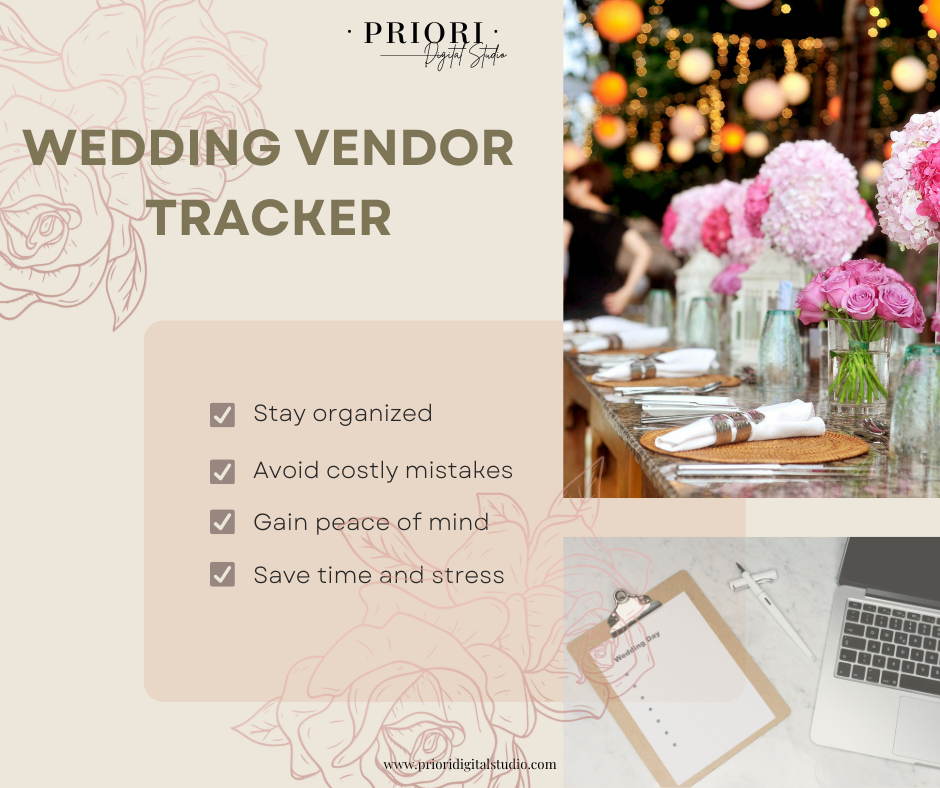Avoiding wedding vendor tracking because it feels overwhelming? You’re not alone. For most couples, vendor management quickly becomes one of the biggest stressors of wedding planning. Between juggling 10+ contracts, multiple payment schedules, and countless emails, it’s easy to lose track of important details.
Common pain points include:
-
Missed deadlines that lead to late fees or lost bookings
-
Misplaced contracts that leave you legally vulnerable
-
Unclear payment schedules that cause last-minute financial stress
The good news? It doesn’t have to be this hard. A structured vendor tracking system , even something as simple as a well-designed spreadsheet , can save you time, money, and stress.
In this guide, we’ll walk you through exactly how to track vendors, organize contracts, and manage payments like a pro. Whether you’re just starting to book vendors or already knee-deep in contracts, consider this your ultimate roadmap to staying organized and stress-free.
Why Vendor Tracking Matters
Most weddings involve more vendors than couples initially realize. According to The Knot 2024 Real Weddings Study, couples typically hire 10 to 14 vendors to bring their big day to life. That’s a lot of contracts, invoices, and deadlines to juggle.
Here’s why tracking them matters:
-
Financial Control: Missed deadlines can mean losing deposits or incurring late fees. Conversely, paying too early without a system might cause double payments.
-
Legal Protection: A centralized record of contracts ensures you’re covered if disputes arise. For instance, understanding a cancellation clause could save you thousands if unexpected changes occur.
-
Peace of Mind: With everything documented in one place, you won’t be lying awake wondering if you forgot to pay the florist or sign the DJ’s contract.
-
Efficiency: Instead of digging through old emails, you’ll have one “command center” where everything is neatly stored and trackable.
Think of vendor tracking as the backbone of stress-free wedding planning. Without it, details slip through the cracks; with it, you have the clarity and confidence to focus on what really matters , celebrating your wedding day.
(For more, see The Knot: Wedding Planning Data)
Types of Wedding Vendors You’ll Likely Hire
Every wedding is unique, but most couples end up working with a similar core group of vendors. Here’s a breakdown:
-
Venue: Often your biggest expense, and usually requires deposits 12–18 months in advance.
-
Caterer/Baker: From plated dinners to cake tastings, expect multiple deadlines for menu approvals and balances.
-
Photographer/Videographer: Contracts often include specific coverage hours and delivery timelines.
-
Florist: Floral design usually accounts for about 9–12% of the wedding budget.
-
Planner/Coordinator: May require monthly retainers or milestone payments.
-
DJ/Band: Entertainment contracts specify performance hours, setup, and overtime fees.
-
Hair & Makeup: Typically requires a deposit plus final payment on the wedding day.
-
Stationery & Rentals: Invitations, signage, linens, and chairs all come with their own deadlines.
-
Transportation: Limousines, buses, or shuttles need scheduling down to the minute.
-
Miscellaneous: Officiants, additional entertainment (like photo booths), or specialty vendors.
The catch? Each vendor has its own unique payment schedule and contract terms. Without a system to track them all, even the most organized couple can feel overwhelmed.
(See Brides: Questions to Ask Wedding Vendors)
Key Details to Track for Every Vendor
When you’re managing multiple vendors, consistency is key. For every vendor, make sure you’re tracking the following:
-
Contact Information: Full name, phone number, and email.
-
Service Details: Package selected, hours of coverage, and deliverables (albums, edited videos, floral counts).
-
Payment Schedule: Deposits, installments, and final balance due.
-
Contract Clauses: Cancellation terms, rescheduling policy, refund details, liability coverage.
-
Important Dates: Due dates for payments, delivery deadlines, service start times.
-
Notes Section: Space for special requests, dietary restrictions, or vendor-specific preferences.
Keeping these categories uniform across all vendors makes it easy to compare and avoid oversights. For example, you’ll immediately notice if your photographer’s final payment is due two weeks before the wedding while your florist’s is due one month before.
This is where a vendor tracking spreadsheet shines. Instead of keeping this information in scattered emails, notebooks, or mental reminders, a centralized tracker consolidates everything in one place. You’ll be able to sort by due date, vendor name, or payment status , giving you a 360° view of your wedding logistics.
(Pro Tip: Explore WeddingWire’s Vendor Guide for vendor cost estimates and timelines.)
Organizing Vendor Contracts
Contracts are your safety net , they protect both you and your vendors. Yet many couples skim them or, worse, lose track of them altogether.
Here’s why they matter:
-
Clarity: Outlines expectations so there’s no “he said, she said.”
-
Protection: Ensures you’re covered if a vendor cancels or fails to deliver.
-
Financial Safeguard: Refund and rescheduling policies can save you thousands.
Key clauses to review include:
-
Cancellation and rescheduling terms
-
Liability coverage (weather, equipment failure, etc.)
-
Refund and non-refundable deposit policies
Best practices for organizing contracts:
-
Keep digital copies in cloud storage (Google Drive, Dropbox) and link them directly in your spreadsheet.
-
Store printed copies in a physical binder for quick access.
-
Label contracts clearly with vendor name + date.
-
Cross-reference contracts with your payment tracker.
By treating your contracts like gold, you’ll eliminate guesswork and feel secure every step of the way.
Tracking Payments & Deadlines
A typical vendor payment structure looks like this:
-
Deposit (20–50%): Secures your date.
-
Milestone Payments: Often due halfway or at specific project stages.
-
Final Balance: Usually due 1–2 weeks before the wedding.
The risks of poor tracking? Missed payments that can result in losing your vendor or incurring late fees. Some vendors even specify in their contracts that late payments void services.
Tools that make tracking easier:
-
Calendar Reminders: Sync due dates with Google Calendar or iCal.
-
Automated Alerts: Many spreadsheets can be set up to trigger notifications.
-
Payment Tracker Spreadsheet: A centralized tool that shows all vendor balances at a glance.
Here’s a simple structure for payment tracking:
|
Vendor |
Deposit Due |
Balance Due |
Amount Paid |
Status |
|
Caterer |
$2,000: Paid Jan 10 |
$4,000: Due Sept 1 |
$2,000 |
✔ |
|
Photographer |
$1,200: Paid Feb 15 |
$1,800: Due Aug 20 |
$1,200 |
Pending |
One look at this chart tells you exactly where you stand , no guessing, no stress.
(For inspiration, check The Knot Budget Tool)
Using a Wedding Vendor Spreadsheet
When it comes to vendor tracking, spreadsheets are a game-changer. Here’s why they beat scattered notes and email threads every time:
Benefits:
-
Centralizes vendor info, contracts, and payments.
-
Allows you to sort and filter by deadlines, vendors, or payment status.
-
Reduces the chance of human error by keeping everything in one place.
Features of an Ideal Vendor Spreadsheet:
-
Separate tabs for vendors, contracts, and payments.
-
Color-coded statuses (e.g., green = paid, yellow = pending, red = overdue).
-
Columns for notes, contact info, and important dates.
-
Optional automatic reminders or linked calendar events.
How to Use It:
-
Input Vendor Details: Add names, contact info, and services.
-
Upload Contracts: Link digital copies stored in Google Drive or Dropbox.
-
Log Payment Deadlines: Include deposit, milestone, and final balance.
-
Track Progress: Use checkboxes or status colors to mark payments completed.
-
Review Weekly: A 5-minute check-in ensures nothing falls through the cracks.
Our Solution:
Our Wedding Planner Spreadsheet comes pre-loaded with vendor management templates. With built-in formulas, payment reminders, and a dedicated notes section, it transforms what feels like chaos into clarity. Couples tell us it saves them hours of stress and prevents costly mistakes like late fees or forgotten deposits.
Instead of juggling multiple tools, you’ll have a single, easy-to-use dashboard that grows with your wedding planning journey.
Pro Tips for Stress-Free Vendor Management
-
Start Early: Top venues and photographers book 12–18 months in advance.
-
Communicate Regularly: Don’t just sign a contract and disappear. Regular check-ins prevent misunderstandings.
-
Delegate: Assign a trusted friend, family member, or planner to double-check deadlines.
-
Keep Emergency Contacts Handy: Save vendors’ cell numbers in your phone for quick access on the wedding day.
-
Confirm Final Details: Touch base with all vendors 2–3 weeks before your wedding to reconfirm arrival times, deliverables, and balances.
These small habits make a massive difference in lowering stress levels and ensuring your big day goes smoothly.
Common Mistakes Couples Make
-
Skipping the Fine Print: Overlooking cancellation policies or hidden fees.
-
Forgetting “Smaller” Vendors: Transportation, rentals, or officiants often slip through the cracks.
-
Paying Late: A result of poor tracking or miscommunication.
-
Losing Contracts or Emails: Not having a centralized storage system.
-
Waiting Too Long to Confirm: Vendors may assume details are final unless you reconfirm.
Avoid these pitfalls, and you’ll save both money and stress.
How Our Wedding Vendor Tracking Spreadsheet Helps
We designed our Wedding Vendor Tracking Spreadsheet specifically to solve the problems couples struggle with most.
Here’s what makes it different:
-
Pre-made formulas that automatically calculate balances and deadlines.
-
Built-in payment reminders to keep you on schedule.
-
A contract notes section for cancellation terms and special requests.
-
Color-coded status updates that let you know instantly what’s pending.
Instead of cobbling together sticky notes and emails, you’ll have everything in one stress-free system. Couples who use it report feeling more confident, more in control, and better able to focus on enjoying their engagement.
Conclusion
Vendor management doesn’t have to be a nightmare. With the right system in place, you’ll gain peace of mind, financial clarity, and the freedom to actually enjoy your wedding planning journey.
Remember: organization is your best friend. By keeping contracts, payments, and deadlines neatly tracked in a single spreadsheet, you’re not just avoiding mistakes , you’re setting yourself up for a smoother, happier wedding day.
Ready to simplify your planning? Download our Wedding Planner Spreadsheet today and take the stress out of vendor tracking.
Additional Resources
Looking for more expert advice? Here are a few trusted guides worth bookmarking:
-
The Knot: Wedding Vendor Contracts 101
-
WeddingWire: Payment Tips for Vendors



Share:
Wedding Guest List: Track RSVPs, Meals & Seating
Wedding Menu Planner: Dietary Needs, Drink Pairings and More